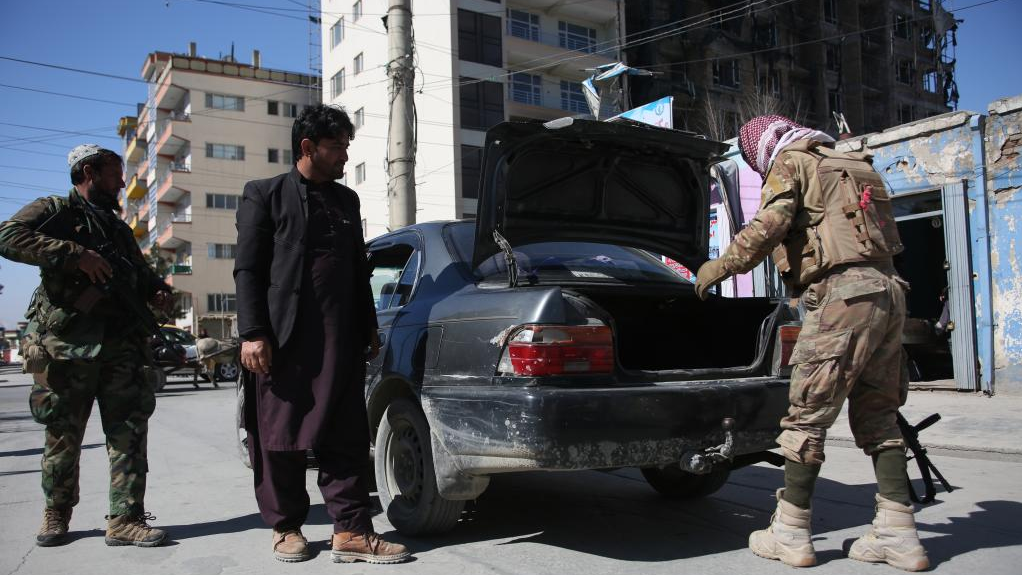
A security checkpoint during a clearance operation in Kabul, Afghanistan, February 26, 2022. /Xinhua
A security checkpoint during a clearance operation in Kabul, Afghanistan, February 26, 2022. /Xinhua
Editor's note: Abu Naser Al Farabi is a Dhaka-based columnist and analyst focusing on international politics, especially Asian Affairs. The article reflects the author's opinions and not necessarily those of CGTN.
While meeting his Afghan counterparts in Kabul after returning from Islamabad last March, Chinese Foreign Minister Wang Yi delivered salient remarks to highlight a viable future path for Afghanistan's sustainable peace and stability. He said, "China is willing to help Afghanistan become independent, achieve independent development, and take Afghanistan's future and destiny into the Afghan people's hands."
On May 27, during a meeting with national security advisers from seven countries including China in the 4th Regional Security Dialogue held in the Tajik capital Dushanbe, India's National Security Adviser Ajit Doval echoed similar sentiments while reiterating that Kabul must be empowered to combat terrorism on their own terms.
As the Biden Administration has recalibrated its long-pursued counterterrorism strategy after botching the U.S. troops withdrawal in Afghanistan last year, it stands imperative to develop a viable and sustainable one for Afghanistan. Given the sheer failures of America's erstwhile "just-war counterterrorism strategy" while it had followed during its longest "war on terror," and the changing political landscape in the country after the Taliban had regained control of Kabul, old standards are no longer applicable.
In a speech marking the end of its war in Afghanistan, President Joe Biden highlighted America's counterterrorism strategic shift and pointed to the "use of limited force." As an alternative to its forever wars, America is "poised to increase its reliance on 'over-the-horizon' operations—a euphuism for drone strikes and special operations forces' raids—to ensure that Afghanistan does not, once again, become a safe haven for transnational terrorism." But given the current political paradigm in the country, and the inherent dangers and devastating track records of this very strategy, the efficacy of the over-the-horizon strategic choice in ensuring sustainable peace and stability would draw big question marks.

A U.S. paratrooper conducts security at Hamid Karzai International Airport in Kabul, Afghanistan, August 29, 2021. /Xinhua
A U.S. paratrooper conducts security at Hamid Karzai International Airport in Kabul, Afghanistan, August 29, 2021. /Xinhua
The over-the-horizon is not a state-of-the-art strategy on the part of Washington. Since the 1990s, successive U.S. presidents have employed the "use of limited force" or "targeted strikes" tactics to defuse terror outfits, particularly Al-Qaeda, which had later proven futile. Following the 9/11 attacks, along with amazing drone technology' upgrades, "over-the-horizon" operations have had a significant boost, particularly during the Barack Obama administration.
But this strategic endeavor has been fraught with overwhelming challenges. Drone operations have lacked operational safeguards, legal compliance, administrative transparency, and inflicted substantial collateral damage and killed many civilian lives.
According to the civilian harm monitoring group Airwars, since the 9/11 terrorist attacks in 2001, "U.S. drone and airstrikes have killed at least 22,000 civilians-and perhaps as many as 48,000—compared with an estimated 387,000 civilians killed by all parties during the long war on terror." Most recently, the deadly U.S. drone strike in Kabul, killed ten civilians—including seven children-and subsequent impunity granted to the perpetrators, has exposed the tragic nature of the long-standing U.S. over-the-horizon counterterrorism strategy.
We have to address the hazards of the program. The U.S. counterterrorism project has had little appraisals over the political dimensions on how they are carried out. There are no sustainable solutions to resolve the problems for the moment.
After the Taliban's accession to power, Afghanistan might return to become a safe haven for transnational terrorists, and hence the counterterrorism strategy requires a rigorous recalibration.
Counter-terrorism programs should be meticulously calculated and aligned with the will of the Afghans. Kabul should also prioritize to confront anti-regime resistance forces on the ground. The examples of Somalia and Yemen have shown that a tenuous state control over the territory can lead to chaos, ready to be exploited by terrorists' extremists.
Therefore, a broader counterterrorism mechanism for Afghanistan should be adapted to the local political and cultural paradigms, with the current regime in Kabul being empowered to exercise statehood, they stand better equipped over police's enforcement.
Additionally, Kabul should foster economic development hoping to attenuate threats from terrorism, which could serve as an effective counterterrorism strategy. There's been a long history of imperialist devastation, geopolitical turf-wars, and the resulting economic and humanitarian catastrophes that have left the country reeling. It's high time global stakeholders accelerate a holistic approach to make Afghanistan economically stable and its people self-reliant, so they can choose their own destiny. The Afghans can remedy their problems at the very roots to confront terrorism from reemerging ever again.
(If you want to contribute and have specific expertise, please contact us at opinions@cgtn.com. Follow @thouse_opinions on Twitter to discover the latest commentaries in the CGTN Opinion Section.)

